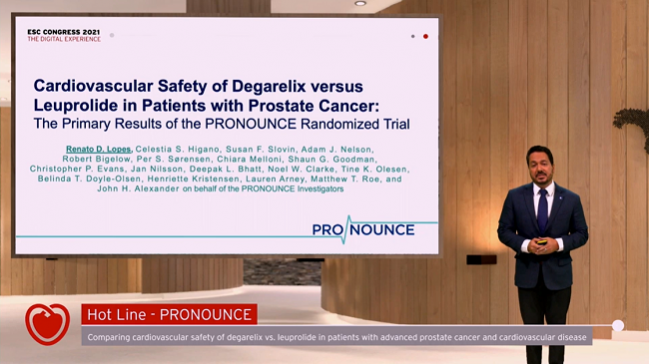PRONOUNCE: No Difference in CVD Risks With Degarelix and Leuprolide for Prostate Cancer
The results are inconclusive, though, because the trial was halted early and thus lacked patients and events.

A head-to-head study comparing two types of androgen-deprivation therapy (ADT) for the treatment of prostate cancer showed there was no difference in the risk of major adverse cardiovascular events between those who received the selective gonadotropin-releasing hormone (GnRH) antagonist degarelix (Firmagon, Ferring Pharmaceuticals) and those treated with the older GnRH agonist leuprolide.
The results, however, are mostly inconclusive given that the trial, known as PRONOUNCE, was halted prematurely.
“PRONOUNCE has important limitations,” said lead investigator Renato Lopes, MD, PhD (Duke Clinical Research Institute, Durham, NC), during his Hot Line presentation at the European Society of Cardiology (ESC) Congress 2021. “The premature termination of enrollment, the lower-than-expected event rate, and the wide confidence intervals still leave us with uncertainty around the cardiovascular safety of degarelix compared with leuprolide.”
Focusing on a broader perspective, Lopes noted that PRONOUNCE is the first dedicated randomized trial with blinded adjudication of cardiovascular events in patients with prostate cancer. Their study, he said, could serve as a “model for interdisciplinary collaboration between urologists, oncologists, and cardiologists, with the shared goal of evaluating the impact of cancer therapies on cardiovascular outcomes.”
Thomas Suter, MD (University of Bern, Switzerland), who chairs the ESC Council of Cardio-Oncology, said that roughly 40% to 50% of men with prostate cancer are treated with ADT. However, observational data show that while patients undergoing ADT are at higher risk of CVD events, both in the short term and in the ensuing 10 years after treatment, it’s only a subgroup who are most at risk, said Suter. “It’s the patients who have preexisting cardiovascular disease, or at least risk factors. That’s something we really should keep in mind,” he stressed.
PRONOUNCE, said Suter, is a welcome addition to the field. But like Lopes, he also said the interpretation of the data is hindered by the early termination and low event rates: “In the end, unfortunately, it’s an inconclusive trial.”
Risks of ASCVD With ADT
Speaking during the Hot Line session, Lopes said that atherosclerotic cardiovascular disease (ASCVD) is the primary non-cancer-related cause of death of men with prostate cancer. While ADT is the cornerstone of treatment, its use has been linked to a higher risk of CVD events. ADT in general increases the risk of diabetes, lowers insulin sensitivity, increases LDL cholesterol and triglycerides, and leads to a loss of skeletal muscle and higher fat mass. The most commonly used ADT agents are the GnRH agonists, such as leuprolide, said Lopes, but they have been linked with a heightened risk of cardiovascular events, “possibly due to the destabilization of the atherosclerotic plaque.”
Given the risks, the US Food and Drug Administration mandated that all manufacturers of GnRH agonists include the potential risk of ASCVD on the product safety information. The European Medicines Agency (EMA) requires the same. GnRH antagonists, such as degarelix, are only used in approximately 3% to 4% of patients treated with ADT, according to Lopes, though their use has been linked with a more favorable CVD profile.
To test the relative cardiovascular risks of the two agents, the PRONOUNCE study was launched at 113 sites in 12 countries. Patients with confirmed prostate cancer and a history of ASCVD (defined as a prior MI, prior percutaneous or surgical revascularization of the carotid, coronary, iliac, femoral, or popliteal arteries, documented stenosis > 50% in any of those vessels, or PAD) were randomized to either degarelix or leuprolide for at least 12 months. With degarelix, patients received a subcutaneous 240-mg loading dose followed by a monthly maintenance dose of 80 mg. Leuprolide dosing was an intramuscular injection of 22.5 mg every 3 months.
At 12 months, the primary endpoint occurred in 4.1% of patients treated with leuprolide and 5.5% of those who received degarelix (P = 0.53). In the sensitivity analysis using an expanded 4-point MACE that included hospitalization for unstable angina, there was again no difference between the two drugs. Other sensitivity analyses showed no difference between treatments.
Study investigators planned to include 900 patients, but given slow enrollment, the data safety and monitoring board (DSMB), in discussions with the study sponsor, terminated the trial in March 2020 with just 545 patients randomized. Additionally, investigators assumed a 1-year MACE rate of 10.2% with leuprolide, but the actual event rate was much lower. Focusing on this lower-than-expected event rate, Suter pointed out that patients in the trial were treated very well with medical therapy, with approximately 84% given statins, 73% renin-angiotensin-aldosterone system (RAAS) inhibitors, and 69% beta-blockers.
‘The Data We Have’
In his discussion following the Hot Line session, Suter highlighted a recent meta-analysis suggesting that there is a lower risk of CVD events and a lower risk of cardiovascular death with the GnRH antagonists, like degarelix. The HERO trial, which tested the GnRH antagonist relugolix (Orgovyx; Myovant Sciences) against leuprolide also reported a lower risk of MACE with relugolix, but that was not a dedicated CVD trial with event adjudication.
The data, said Suter, “isn’t quite as good as we want it to be, but this is the data we have.”
While PRONOUNCE failed to differentiate the CVD risks between the two ADT drugs, Suter said it remains important for physicians to identify high-risk patients so that they can keep close tabs on their heart while undergoing cancer treatment. Lopes made a similar point, stating that “a systematic baseline cardiovascular risk assessment is important before initiating cancer therapies.”
For Rudolf de Boer, MD, PhD (University Medical Center, Groningen, the Netherlands), who is the liaison officer for the ESC’s Council of Cardio-Oncology and began a cardio-oncology service at his hospital 3 years ago, cardiologists play a vital role in caring for patients with cancer. Their role is not about being a barrier to treatment, but rather helping to facilitate the best possible outcomes for treated patients, he said. “You form a team and persuade [oncologists] that because of you being involved, the chances are the patient may be put on cancer therapy for a longer time and may have a resolution of the malignant disease.”
Michael O’Riordan is the Managing Editor for TCTMD. He completed his undergraduate degrees at Queen’s University in Kingston, ON, and…
Read Full BioSources
Lopes RD, Higano CS, Slovin SF, et al. Cardiovascular safety of degarelix versus leuprolide in patients with prostate cancer: the primary results of the PRONOUNCE randomized trial. Circulation 2021;Epub ahead of print.
Disclosures
- Ferring Pharmaceuticals funded the PRONOUNCE trial.
- Lopes reports grant support paid to his institution and/or consulting fees from Bayer, Boehringer Ingelheim, Bristol Myers Squibb, Daiichi Sankyo, GlaxoSmithKline, Medtronic, Merck, Pfizer, Portola, and Sanofi.





Comments